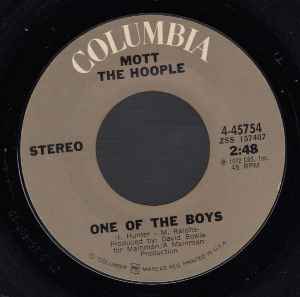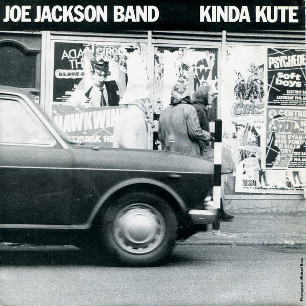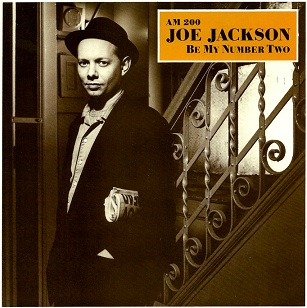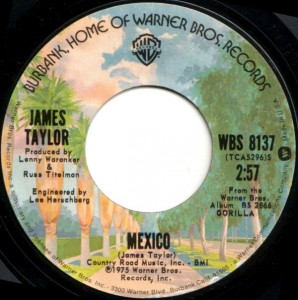
David Ian "Joe" Jackson is an English musician, singer and songwriter. Having spent years studying music and playing clubs, he scored a hit with his first release, "Is She Really Going Out with Him?", in 1979. It was followed by a number of new wave singles, before he moved to more jazz-inflected pop music and had a top 10 hit in 1982 with "Steppin' Out". Jackson is associated with the 1980s Second British Invasion of the US. He has also composed classical music. He has recorded 20 studio albums and received five Grammy Award nominations.

Look Sharp! is the debut album by Joe Jackson, released in January 1979. The album features one of Jackson's most well-known songs, "Is She Really Going Out with Him?", as well as the title track "Look Sharp", "Sunday Papers", "One More Time" and "Fools in Love".

I'm the Man is the second album by English musician Joe Jackson, released in October 1979. Released shortly after Jackson's breakthrough debut, Look Sharp!, I'm the Man saw Jackson continue the style of his earlier album. Singles from the album included "I'm the Man" and "It's Different for Girls", the latter of which was his biggest UK chart single, peaking at number five on the UK Singles Chart.

Beat Crazy is the third album by Joe Jackson, released in October 1980 and credited to the Joe Jackson Band. It was a relative disappointment commercially, peaking outside the Top 40 in both the UK and the United States, with its singles failing to chart. One reason for the reduced sales in the U.S. may have been that the group did not tour to support it there. Nevertheless, the Joe Jackson Band was successful and toured extensively. This would be the last studio album released by the Joe Jackson Band's original line-up until 2003's Volume 4.

"One of the Boys" is a song written by Ian Hunter and Mick Ralphs that was released on Mott the Hoople's 1972 album All the Young Dudes. It was also released as the b-side of the "All the Young Dudes" single in some countries. It was released as a single in its own right in the US.

Body and Soul is the seventh studio album by English singer-songwriter Joe Jackson, released on 14 March 1984 by A&M Records. Jackson's first fully digital project, it peaked at No. 14 in the UK, while in the US it reached No. 20. Described by one reviewer as a sophisti-pop album, the tracks are a mix of pop, jazz and Latin music, showcasing the hit single "You Can't Get What You Want ". Two other singles fared well, with "Happy Ending" charting in five countries, and "Be My Number Two" enjoying moderate success in the UK.

"Take It Easy" is the debut single by the American rock band Eagles, written by Jackson Browne and Eagles band member Glenn Frey, who also provides lead vocals. It was released on May 1, 1972, and peaked at No. 12 on the Billboard Hot 100 chart on July 22, 1972. It was also the opening track of the band's eponymous debut album and has become one of their signature songs, included on all of their live and compilation albums. It is listed as one of The Rock and Roll Hall of Fame's 500 Songs that Shaped Rock and Roll.

"Is She Really Going Out with Him?" is a song written and performed by British musician Joe Jackson. It was released in October 1978 as his debut single and was later included on Jackson's debut album, Look Sharp! The track was one of the first Jackson recorded with his new backing band, a band he would perform with for his first three albums. Written as a humorous commentary on women dating unattractive men, the song contains a prominent bass line and a chorus praised by critics as memorable. Jackson has since stated that the song's reputation for being angry was untrue.

Volume 4 is the 16th studio album by British musician Joe Jackson, released in 2003. It was the first album to feature the Joe Jackson Band since the 1980 release, Beat Crazy, and it was Jackson's first rock 'n' roll album since Laughter and Lust, which was released in 1991. As before, the Joe Jackson Band consisted of Jackson, Graham Maby, David Houghton and Gary Sanford. Jackson said at the time that he expected the songs on the album to be "in the spirit of the first couple of albums, but with a bit of the greater maturity I'd like to think I've acquired. And I've still got a 32-inch waist — so I don't think it's going to be embarrassing".
"Dancing with Mr. D." is the opening track of the English rock and roll band the Rolling Stones' 1973 album Goats Head Soup.
"Got the Time" is a song written and performed by the British new wave musician Joe Jackson, appearing as the closing track on his 1979 debut album, Look Sharp!. The song has since been performed frequently in live concerts by Jackson.

"It’s Different for Girls" is a song by Joe Jackson appearing on his 1979 album, I'm the Man. The song has since become one of his most successful singles, notably being the highest charting Joe Jackson single in the UK. Covers have been recorded and released by several different artists.

"Sunday Papers" is a song written and performed by British new wave musician Joe Jackson. It was released on his debut album, Look Sharp!. Written as a critique of the British press, "Sunday Papers" features mocking lyrics and reggae-inspired music.

"Kinda Kute" is a song by British singer-songwriter and musician Joe Jackson, which was released in 1980 as the third and final single from his second studio album I'm the Man (1979). Described as a "pop song" by Jackson, the song was written by Jackson and produced by David Kershenbaum. "Kinda Kute" failed to chart in the UK, but reached number 91 on Canada's RPM Top Singles chart.

"Be My Number Two" is a song by British singer-songwriter and musician Joe Jackson, which was released in 1984 as the third and final single from his sixth studio album Body and Soul. It was written by Jackson, and produced by Jackson and David Kershenbaum. "Be My Number Two" reached No. 70 in the UK and remained in the charts for four weeks.
"Jamaica Say You Will" is a song written and performed by American singer-songwriter Jackson Browne. It is the first song on his 1972 self-titled debut album.

"Mexico" is a song written by James Taylor that first appeared as the opening track of his 1975 album Gorilla. It was released as a single, with the album's title track as the B-side, and reached No. 49 on the Billboard Hot 100, but performed much better on the Adult Contemporary chart, reaching No. 5. "Mexico" has appeared on many of Taylor's live and compilation albums. It has been covered by Jimmy Buffett, Alex de Grassi and Lauren Laverne.

"Precious" is a song written by Chrissie Hynde and performed by her band the Pretenders. First released on the band's self-titled debut album in late 1979, the song features punk-inspired music and aggressive lyrics.

"Beat Crazy" is the title track to the Joe Jackson Band's 1981 album, Beat Crazy. Written by Joe Jackson, and sung by Graham Maby, it was released as a single in 1981.

"Mad at You" is a song by the Joe Jackson Band, which was released in 1980 as the lead single from Jackson's third studio album Beat Crazy. The song was written and produced by Jackson.

















